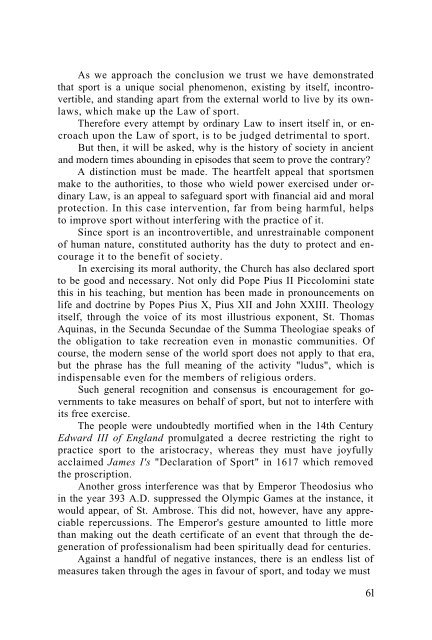download - IOA
download - IOA
download - IOA
Create successful ePaper yourself
Turn your PDF publications into a flip-book with our unique Google optimized e-Paper software.
As we approach the conclusion we trust we have demonstrated<br />
that sport is a unique social phenomenon, existing by itself, incontrovertible,<br />
and standing apart from the external world to live by its ownlaws,<br />
which make up the Law of sport.<br />
Therefore every attempt by ordinary Law to insert itself in, or encroach<br />
upon the Law of sport, is to be judged detrimental to sport.<br />
But then, it will be asked, why is the history of society in ancient<br />
and modern times abounding in episodes that seem to prove the contrary?<br />
A distinction must be made. The heartfelt appeal that sportsmen<br />
make to the authorities, to those who wield power exercised under ordinary<br />
Law, is an appeal to safeguard sport with financial aid and moral<br />
protection. In this case intervention, far from being harmful, helps<br />
to improve sport without interfering with the practice of it.<br />
Since sport is an incontrovertible, and unrestrainable component<br />
of human nature, constituted authority has the duty to protect and encourage<br />
it to the benefit of society.<br />
In exercising its moral authority, the Church has also declared sport<br />
to be good and necessary. Not only did Pope Pius II Piccolomini state<br />
this in his teaching, but mention has been made in pronouncements on<br />
life and doctrine by Popes Pius X, Pius XII and John XXIII. Theology<br />
itself, through the voice of its most illustrious exponent, St. Thomas<br />
Aquinas, in the Secunda Secundae of the Summa Theologiae speaks of<br />
the obligation to take recreation even in monastic communities. Of<br />
course, the modern sense of the world sport does not apply to that era,<br />
but the phrase has the full meaning of the activity "ludus", which is<br />
indispensable even for the members of religious orders.<br />
Such general recognition and consensus is encouragement for governments<br />
to take measures on behalf of sport, but not to interfere with<br />
its free exercise.<br />
The people were undoubtedly mortified when in the 14th Century<br />
Edward III of England promulgated a decree restricting the right to<br />
practice sport to the aristocracy, whereas they must have joyfully<br />
acclaimed James I's "Declaration of Sport" in 1617 which removed<br />
the proscription.<br />
Another gross interference was that by Emperor Theodosius who<br />
in the year 393 A.D. suppressed the Olympic Games at the instance, it<br />
would appear, of St. Ambrose. This did not, however, have any appreciable<br />
repercussions. The Emperor's gesture amounted to little more<br />
than making out the death certificate of an event that through the degeneration<br />
of professionalism had been spiritually dead for centuries.<br />
Against a handful of negative instances, there is an endless list of<br />
measures taken through the ages in favour of sport, and today we must<br />
61

















